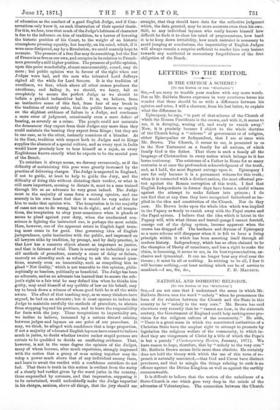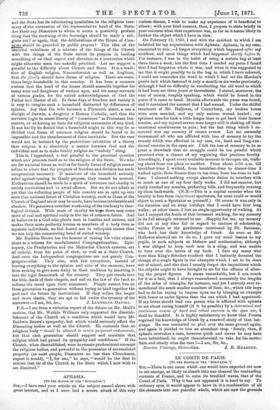NATIONAL AND DOMESTIC RELIGION. [TO THE EDITOR OF THE 'SPECTATOR."]
SIR,—I am not sure that I understand the sense in which Mr. Baldwin Brown uses the word " unholy " when he pronounces the form of the relation between the Church and the State in this country to be "unholy to the very core." Mr. Brown has said elsewhere very recently that he "cannot gee how, in the sixteenth century, the Government of England could help makingsome pro- vision for the religious culture of the community." He adds, "There is a great sense in which the constituted authorities of a Christian State have the amplest right to attempt to promote by legislation the religious welfare of the community, in which in- deed they are vicegerents of Christ by a title of which the Pope's is but a parody" (Contemporary Review, January, 1871). We have reason to hope, therefore, that by "unholy to the very core" Mr. Baldwin Brown means little more than obsolete. He certainly does not hold the theory with which the use of this term of re- proach is naturally associated,—that God and CEesar have distinct provinces, and that to mingle the things relating to each is an offence against the Divine Kingdom as well as against the earthly commonwealth.
It is difficult to believe that the notion of the unholiness of a State-Church is one which goes very deep in the minds of the advocates of Voluntaryism. The connection between the Church
and the State has its culminating symbolism in the religious cere- mony of the coronation of the representative head of the State.
Are there any Dissenters to whom it seems a positively profane thing that the crowning of the Sovereign should be made a reli- gious act ? or again, that the deliberations of the House of Com- mons should be preceded by public prayers? This idea of the
essential unholiness of a mixture of the things of the Church with the things of the State serves its purpose in lending
something of an ideal aspect and elevation to a contention which might otherwise seem too nakedly practical. Let me suggest a parallel to the difficulty about Church and State. It is a tradi- tion of English religion, Nonconformist as well as Anglican, that the family should have forms of religion. There are some- times large households in this country. It has been a common custom that the head of the house should assemble together his many sons and daughters of various ages, and his many servants of various grades, for the united acknowledgment of God the Father and Master of all. In these days of freedom and variety it is easy to imagine such a household distracted by differences of opinion. Say that the wife becomes a Plymouth sister, a son a disciple of Darwin, a daughter a Roman Catholic, and that the servants begin to assert liberty of "conscience" as Protestant Dis- senters, or as having no taste for religious ceremonies of any kind.
It can hardly be denied that a household might in this way be so divided that forms of common religion should be found to be impossible and the abandonment of them inevitable. But the case would not be bettered by the pretentious exhibition of a theory that religion is so absolutely a matter between God and the individual soul as to make family religion an " unholy " thing.
This is, I apprehend, a real parallel to the practical question which now presents; itself as to the religion of the State. We who are for national forms as well as for family forms of religion cannot refuse to admit that the progress of freedom and division has made compromises necessary. If members of the household seriously rebel against coming to family prayers, they cannot be coerced.
Endeavours should be made in a spirit of reverence and charity to satisfy convictions and to avoid offence. But we do not admit as yet that the reflecting people of this country are so split up into sects that national forms of Christian worship, such as those of the Church of England are or may be made, have become intolerable and obsolete. We perceive a manifest weakening of the tendency to theo- logical division. With more of charity we hope there may come more of real and spiritual unity in the use of common forms. And as believers in a God who plants men in families and nations, and makes them more perfectly human as members of a body than as separate individuals, we feel bound not to relinquish sooner than we can help the consecrating bond of united worship.
Mr. Baldwin Brown has the honour of raising his voice almost alone as a witness for unadulterated Congregationalism. Epis- copacy, the Presbyterian and the Methodist Church systems, are all unholy, from his point of view, as well as a State Church. And even the Independent congregations are not purely Con- gregationalist. They also, with few exceptions, instead of leaving everything to the opinion and vote of the moment, have been seeking to give some fixity to their tradition by inserting it into the legal framework of the country. They put creeds into the title-deeds of their chapels, and call on the law of the land to enforce the creed upon their successors. People cannot live on from generation to generation without trying to bind together the past and the future by institutions. If they refuse the larger and more elastic, they are apt to fall under the tyranny of the P.S.—I see from a verbatim report of the debate on Mr. Miall's motion, that Mr. Watkin Williams only supported the disestab- lisbment of the Church on a condition which would have Mr.
Baldwin Brown's sympathy, but which would seriously affect the Dissenting bodies as well as the Church. He contends that no religious body "should be allowed to retain perpetual endowments, but that each generation should support and maifitain that, religion which had gained its sympathy and confidence." If the Church, when disestablished, were to remain predominant amongst the religious bodies, and powerful in the possession of accumulated property (as most people, Dissenters no less than Churchmen,
expect it would), "I, for one," he says, "would be the first to restore that tie of the Church to the State which I now wish to see dissolved."



































 Previous page
Previous page